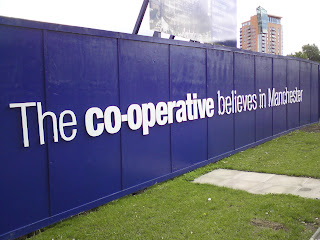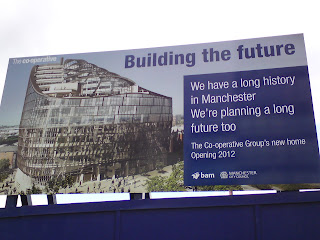
Fundamentally, both the Council and the Co-op believe that a partnership approach will deliver this next great piece of urban development in the UK… through the pursuit of a common goal of high quality, socially inclusive, sustainable and economically successful urban regeneration… For the Council, the common goals reflect the regeneration objectives that will keep Manchester at the forefront of economic and social change.
The shiny new Co-op Quarter in the north of the city centre presents us with a microcosm of future Manchester – partnership-led regeneration to pioneer the low-carbon economy and spur new investment in our supposedly green and sustainable tomorrow. Problem is, that model is the same that’s been used for the past 20 years, and it hasn’t exactly brought about the perpetually promised prosperity and inclusion for the majority in Manchester.
Manchester City Council (MCC) recently handed over £20 million to the Co-operative Group for the redevelopment of the so-called ‘Northern Gateway’ into the city centre. The Co-op Quarter is set to cover 3.5 million square feet of land behind the M.E.N. Arena when it’s done, centred around a brand new head office on Miller Street. According to the Co-op the 15-storey HQ – which should be completed by 2012 at a cost of £100 million – will be “one of the most sustainable in Europe.”
The funding was endorsed in principle back in May 2008, and after the approval of the Co-op’s Strategic Regeneration Initiative (SRI) in May 2009 and subsequent consultation and planning permission, it was finally confirmed by the Council Executive last month.
The Council will “contribute £12m towards the development of public spaces which will be focused on creating a sense of place and world-class environment… by delivering the highest quality of public realm, improved pedestrian linkages and new high quality open spaces over the first phase and subsequent phases” while a cap of £8 million “will be allocated to a contribution towards infrastructure work, primarily focused on the narrowing of Miller Street.” The rest, expected to be in the region of £120-£150 million, will be put up by the Co-op.

People may argue that MCC could be putting taxpayer money in worse places. After all, the Co-op does ‘ethical investment’ doesn’t it? But maybe that’s not the right question.
The Co-op makes “profit for a purpose”, and partly due to what now seems like prudent investment policies after the global economic crisis, it’s been doing very well at that recently. While numerous banks, property developers and companies in similarly high-risk sectors have crumbled around it, the Co-op has been posting huge profits and growth. Last month it paid out record dividends of over £50 million to its shareholders, while sales last year were approaching £14 billion.
Why then does the Council think it needs taxpayers’ money, especially at a time when swingeing cuts are supposedly necessary everywhere else? Why doesn’t the Co-op pay for all of it? Profit’s “for a purpose” after all. Because the fact that it treats its staff a bit better than Wal-Mart and doesn’t shovel cash into the Burmese military junta doesn’t mean it doesn’t act like any other business, a huge and powerful one at that.
There were suggestions before the Co-op announced in late 2008 its intention to stay in the City Centre that the Group was considering moving out of town to either Oldham or Rochdale. MCC certainly didn’t want to lose one of the city’s most recognisable icons. In our post-industrial, globalised city, we’re told image counts for a lot when it comes to the all-encompassing end-game of attracting investors. The City Council recognises it has to “create world-class destinations and provide the conditions to attract further investment” and generate “the right conditions and attractive environment” for that to happen. If making the city nice for developers means throwing a load of money at the project then so be it.
The Co-op of course has deep roots in Manchester, as does the Labour Party, which has controlled the City Council it seems for time immemorial. The two are also intricately bound up with one another. This was obvious for all to see at the Executive meeting in May 2009. When the Co-op Quarter item came up councillors streamed out of the room, unable to participate in the discussion due to conflicts of interest regarding the project. The meeting only just had enough members remaining to proceed.

The Council was desperate to enter another ‘local partnership’. Public-private partnerships (PPP) have been the mainstay of local development policy for over 20 years now. In 1987, after another shocking national defeat to Thatcher’s Conservatives, the Labour Council, led by the current Blackley and Broughton MP Graham Stringer, became proto-New-Labour, “modernising” and giving up on the idea of ‘Municipal Socialism’ – though it wasn’t something they were exactly putting into practice. They embarked upon the brave new world of entrepreneurialism and PPP. It’s something they became very good at.
The new mantra was geared towards winning funding for projects embarked upon with private sector partners. Mega development schemes functioned this way throughout the ’90s and ’00s – think Hulme regeneration, the redevelopment of the city centre after the IRA bomb in 1996, the Commonwealth Games and New East Manchester. While the city elite celebrated the so-called urban renaissance as investment flooded in, the cold reality saw public money effectively pouring into the coffers of private developers.
Prosperity and jobs were always the promised outcomes of incoming capital, but what was really being fuelled were gentrification, a property boom and an increasingly exclusive city where enclaves of poverty and inequality persisted and grew. At the same time every bit of this city’s proud cultural past became bastardised and commodified, allowing the likes of Urban Splash’s Tom Bloxham (MBE) and Ian Simpson to become icons of the ostensibly ‘creative city’.
Meanwhile, as quangos and local partnerships blossomed – where lines between democratic decision-making and private profit-seeking were becoming increasingly blurred – those operating at the top of the public-private sphere became ever more powerful. Out of the ranks of the so-called ‘Manchester Mafia’ came the rise and rise of MCC Chief Executive Sir Howard Bernstein and new Council Leader Sir Richard Leese.
A couple of years before his death Tony Wilson was talking in Liverpool and said that their city was “fucked” because they didn’t have an enlightened despot like Manchester had Bernstein. For Urbis co-founder Justin O’Connor this “set a seal on the increasing moral and political bankruptcy of the post-rave urban growth coalition which had taken over Manchester post-1996.”
Of course Wilson meant this as a compliment to Sir Howard, but despite the former Factory Records man’s questionable judgement it highlighted the pre-eminence of the Council’s seemingly omnipresent chief exec. Returning to the Co-op Quarter we find none other than Bernstein on the Project Board, “comprising the City Council’s Chief Executive and senior representatives from the Co-op,” who “meet regularly to oversee the project, the regeneration objectives and to take forward priority actions.”

This supposedly “community-led” scheme works within the very narrow parameters of traditional PPP. The public consultation, which lasted less than a month, managed to elicit a staggering 14 responses.
The Co-op’s plans for a ‘green’ HQ do look genuinely exciting and innovative, and could act as a catalyst for wider changes needed in the city. But beyond that it’s the tired slogans of “creating identity” and “laying foundations for investments.” There’s more to urban sustainability than how energy and water are sourced and how much waste and carbon is produced each day.
So what exactly is meant by the Co-op’s corporate-speaking masterplan when it talks of “adding value for local communities?” Or the third contribution to the Community Strategy identified by the Council, the mind-blowingly vacuous phrase “individual and collective self esteem – mutual respect?”
The fourth, “Neighbourhoods of Choice,” is specifically about attracting people with ‘aspiration’ to the area, young people coming to live and work in the ‘knowledge economy’ while consuming the ‘service economy’. Others see it as code for yuppie flats. But it’s supposed to be a regeneration project, about creating opportunities for those who really need it in the surrounding and affected areas of Cheetham, Ancoats, Clayton and the City Centre.

Over the next 15-20 years it’s said that 15,000 jobs will potentially be created by the whole project. These estimates often fall way short, but even if it turns out true that’s only 750 to 1,000 jobs per year, without specifying what the jobs might be. In what almost seems like the Town Hall document equivalent of a Freudian slip, the reports don’t even refer to any impact on poverty reduction, one of the criteria such proposals are assessed by. The new Co-operative Academy set to open in Blackley in September is all well and good – well, if you believe in private interests, in this case a multi-billion pound corporate entity, setting curriculums.
There are chinks of light here and there. Take the SRI section titled “Jobs and community”, and under ‘Working together’ what could happen:
Renewable energy systems may generate surplus heat which could be connected to neighbourhood systems to address fuel poverty. The public open space could facilitate community markets, supported by urban farming and community allotment initiatives.
But it’s no more than a glimpse. In the end we see the same old policies, coming from the same old ‘leaders’. Bereft of ideas, they pursue that which has manifestly failed to address issues of poverty, inequality and exclusion in Manchester, or anywhere else for that matter. Maybe that’s exactly why they pursue them, or it’s the only way they know how to keep the unquestionable wheels of growth and profit turning.
Don’t let the shiny brochures fool you. Just because it’s the Co-op and it’s low-energy doesn’t mean this development is somehow different. In the end it’s just another market opportunity to create and exploit. That’s a system they’re all desperate to sustain, whatever the cost.
Words: Andy Lockhart
Pictures: Ian Pennington

No comments:
Post a Comment